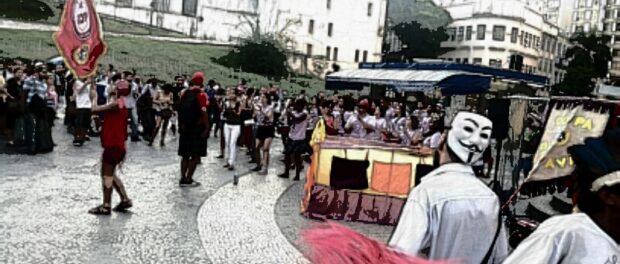
On February 12, the Marvelous City saw a new street parade, or bloco, join the other 456 blocos of carnival. Participants assembled in Largo da Carioca, in the city center near the Carioca metro station. This bloco was an initiative of a group called Occupy Carnival (Ocupa Carnaval), which describes itself as a politically oriented group, in collaboration with the groups Comuna que Pariu, Apafunk, and Planta na Mente, which fight for women’s rights, social equality, and the legalization of marijuana, respectively.
The bloco started out with seventeen people and, at its apex, drew around 500. One thousand people had signed up via the Facebook event page. It was a politicized bloco, with traditional carnival songs presented with a twist in their lyrics. One of the musicians present said: “We can’t forget about all the things and problems happening around us just because we have carnival.”
The lyrics performed during the recent bloco were often politically explicit. “Cidade Maravilhosa,” a famous song, had its lyrics rewritten as: “Crib of bullets and police trucks, stealing the peoples’ souls. It’s the altar of the great removals, done violently.” Planta na Mente changed the lyrics of “Asa Branca” to say: “When the red of your eyes is not blood on the floor.” A line from “Cachaça” was rewritten as: “The police tank kills.” The three adapted lyrics reference police violence against the population of Rio. The performers also adapted “Mamãe Eu Quero” to focus on the bus fare hike from R$3.00 to $3.40 (USD$1.50 to $1.70) between 2014 and 2015 and ask: “Who is going to pay taxes? Skip the turnstyle, skip the turnstyle.”
The bloco‘s songs recalled the protest songs of the 1960s during the military dictatorship, songs written as part of the popular Bossa Nova musical genre, by politically and socially oriented musicians during that time, such as Chico Buarque and Elis Regina. Protest songs had implicit and explicit messages against government oppression and torture. Lyrics such as, “Father, take from me this chalice of red wine of blood” from Cálice, emphasized the torture and murder of civilians that occurred during the authoritarian regime, especially during the Médici government. The Como Nossos Pais lyrics, “We are still the same as before and live like our parents,” showed the pain suffered during the military dictatorship and argued that, even with Brazil’s efforts to develop economically and socially, the country had stagnated and its citizens had become as conservative as preceding generations.
The increase in political tension between the Brazilian government and its citizens re-erupted in 2013. In that year, there were protests in almost every state in Brazil, with the largest nationwide occurring in Rio de Janeiro on June 20 with some 300,000 people. Some referred to these collectively as the “Brazilian Spring”, “Vinegar Revolt,” the “June Journeys,” and other names, and they sparked international attention as the largest protest movement in the country since 1992’s calls for impeachment of then-president Fernando Collor. The demonstrations were sparked by announcements of a bus fare increase; they evolved into broader protests against all malfunctioning parts of governance and civic life, with a focus on poor quality public health and education, and huge expenditures associated with mega-events.
Though police intimidation has reduced protesting, public frustration looms large. It is only a matter of time before it increasingly impacts the nature and frivolity of carnival. Or, perhaps, we are still the same as before and live like our parents.
